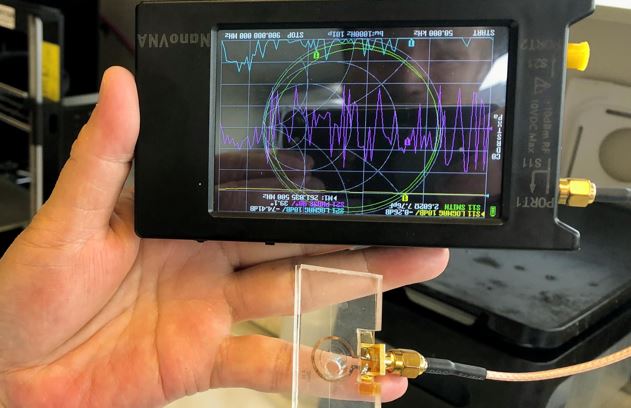Science
University of Waterloo Unveils Rapid Handheld E. Coli Detector

A team from the University of Waterloo has developed an innovative handheld device capable of rapidly detecting potentially deadly E. coli in water. This new technology significantly reduces testing time from hours or even days to just one minute. Team leader Dr. Carolyn Ren, a professor of mechanical and mechatronics engineering and the Canada Research Chair in Microfluidic Technologies, emphasized the urgency of swift testing, noting that contaminated water may be consumed before results from traditional lab-based methods are returned.
The device, referred to as a microwave sensor, is both compact and economical. It can be constructed for as little as $70, while the individual testing tips cost approximately $1 each. This affordability and efficiency make the device particularly valuable, especially in regions where access to reliable water testing is limited.
Transforming Water Safety Testing
Dr. Ren highlighted the severe risks associated with the O157 strain of E. coli, which can be fatal. The new detection method presents a significant advancement in water safety protocols. According to a statement from the university, the device has the potential to “help save lives and reduce illness,” particularly in developing countries where the threat of E. coli contamination is more pronounced.
The rapid response capability of this technology is crucial in areas with limited resources for laboratory testing. By enabling immediate results, communities can take prompt action if contamination is detected, thereby preventing the consumption of unsafe water. Moreover, the device’s design allows for scalability, making it suitable for testing larger water samples in accordance with international E. coli testing standards.
As the world grapples with ongoing challenges related to water quality and safety, innovations like this handheld E. coli detector could play a pivotal role in protecting public health. The University of Waterloo’s breakthrough is not just a technological advancement; it represents a significant step towards ensuring safer drinking water for vulnerable populations globally.
-

 Science1 week ago
Science1 week agoMicrosoft Confirms U.S. Law Overrules Canadian Data Sovereignty
-

 Technology1 week ago
Technology1 week agoGoogle Pixel 10 Pro Fold Specs Unveiled Ahead of Launch
-

 Technology1 week ago
Technology1 week agoWorld of Warcraft Players Buzz Over 19-Quest Bee Challenge
-

 Science5 days ago
Science5 days agoChina’s Wukong Spacesuit Sets New Standard for AI in Space
-

 Health6 days ago
Health6 days agoRideau LRT Station Closed Following Fatal Cardiac Incident
-

 Science1 week ago
Science1 week agoXi Labs Innovates with New AI Operating System Set for 2025 Launch
-

 Lifestyle6 days ago
Lifestyle6 days agoVancouver’s Mini Mini Market Showcases Young Creatives
-

 Science1 week ago
Science1 week agoInfrastructure Overhaul Drives AI Integration at JPMorgan Chase
-

 Technology1 week ago
Technology1 week agoHumanoid Robots Compete in Hilarious Debut Games in Beijing
-

 Top Stories1 week ago
Top Stories1 week agoSurrey Ends Horse Racing at Fraser Downs for Major Redevelopment
-

 Technology1 week ago
Technology1 week agoNew IDR01 Smart Ring Offers Advanced Sports Tracking for $169
-

 Health6 days ago
Health6 days agoB.C. Review Urges Changes in Rare-Disease Drug Funding System
-

 Technology5 days ago
Technology5 days agoDragon Ball: Sparking! Zero Launching on Switch and Switch 2 This November
-

 Technology1 week ago
Technology1 week agoGlobal Launch of Ragnarok M: Classic Set for September 3, 2025
-

 Technology1 week ago
Technology1 week agoFuture Entertainment Launches DDoD with Gameplay Trailer Showcase
-

 Science1 week ago
Science1 week agoNew Precision Approach to Treating Depression Tailors Care to Patients
-

 Business6 days ago
Business6 days agoCanadian Stock Index Rises Slightly Amid Mixed U.S. Markets
-

 Technology1 week ago
Technology1 week agoInnovative 140W GaN Travel Adapter Combines Power and Convenience
-

 Education5 days ago
Education5 days agoParents Demand a Voice in Winnipeg’s Curriculum Changes
-

 Business1 week ago
Business1 week agoNew Estimates Reveal ChatGPT-5 Energy Use Could Soar
-

 Health5 days ago
Health5 days agoRideau LRT Station Closed Following Fatal Cardiac Arrest Incident
-

 Business5 days ago
Business5 days agoAir Canada and Flight Attendants Resume Negotiations Amid Ongoing Strike
-

 Health1 week ago
Health1 week agoGiant Boba and Unique Treats Take Center Stage at Ottawa’s Newest Bubble Tea Shop
-

 Lifestyle1 week ago
Lifestyle1 week agoEleven Madison Park to Reinstate Meat After Vegan Experiment










